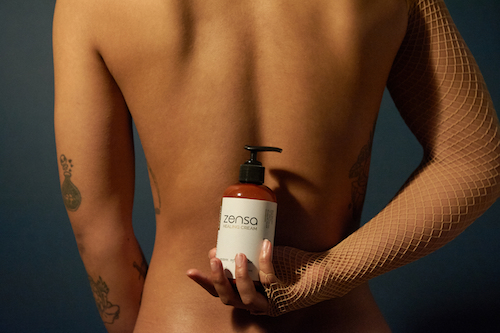9 Types of Uneven Skin Texture: Causes & Treatment
9 Types of Uneven Skin Texture: Causes & Treatment
If you’re stressed about uneven skin texture, know that you’re not alone. A coarse complexion is quite common and can be frustrating to look at, especially when the issue becomes chronic. Skin texture concerns come in many different forms. The first step to clearing up your condition is understanding its root cause. There are many causes of uneven skin texture that range from clogged pores, inflammation and using the wrong products for your skin to malnourished skin, sun damage, an unhealthy lifestyle and more.
Evaluate your most glaring symptoms – whether it’s dealing with persistent bumps, deep creases, rough patches or inflammation. These observations, along with some skincare knowledge and potential treatments, can help you address the problem below the surface.
Here’s a guide to the various types of uneven skin texture, why they happen and how to get rid of it for smooth and improved skin.
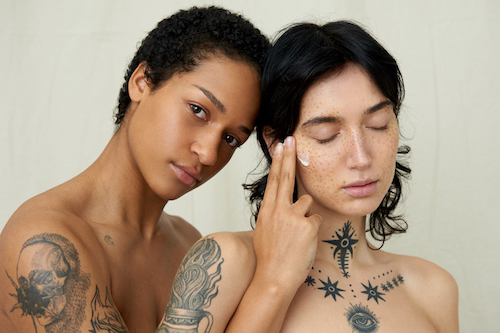
Chronic Acne
Blocked hair follicles (filled with excess dead skin cells, bacteria, oil or dirt) cause acne. Clogged pores don’t have an age limit. This stressful skin condition can occur at any age – during or well beyond your teenage years. Acne often shows up on the face, back, shoulders and chest and is caused by factors, including excess sebum (oil) production, bacterial infection, slow cellular turnover and inflammation. Whiteheads, blackheads, small red pimples (with or without a white center) and deep cyst-like bumps are common types of acne that have the same fundamental cause. They all present the same problem differently, depending on how close the blockage and inflammation are to the skin’s surface.
Some typical causes of acne include hormonal changes (which can affect sebum production), diet (dairy and sugary, processed foods are common culprits), overly dry skin, not washing off your makeup or using dirty pillowcases and towels.
Acne Scars (And General Scarring)
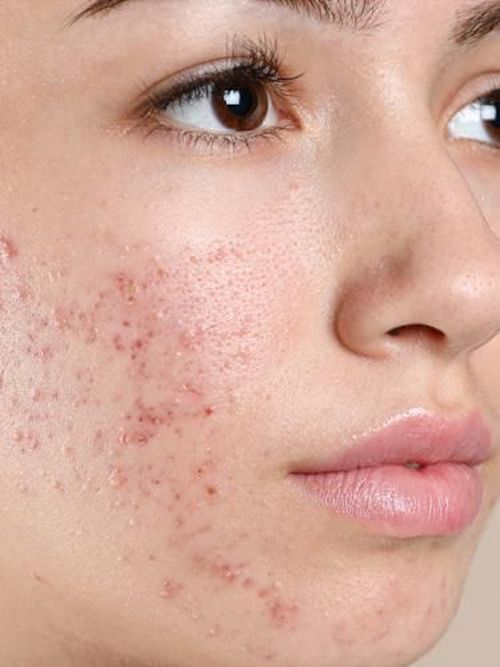
Credit: Requil/Pinterest
Breakouts can cause more skin texture issues and leave behind scars once they’re gone. Inflammatory and cystic acne that deeply penetrate the skin are more likely to damage the skin tissues than the average pimple and leave you more susceptible to future scarring. Acne scars can sometimes be prevented with immediate treatment. Delaying or not treating inflammatory acne increases your risk significantly for scarring – along with more painful skin and potential infections.
Acne scars result from the skin producing too much or little collagen during the healing process. Depressed scars occur when your skin does not produce enough collagen. The lack of collagen leaves the healed tissue underdeveloped and sunken in, causing pits (depressions) to form. Raised acne scars are caused by too much collagen production while healing and excess scar tissue protrude from the damaged area.
Inflammatory acne often causes depressed acne scars, while cystic bumps leave you more vulnerable to developing raised acne scars. Depressed scars are more common than raised ones.
Scars can also result from injuries, previous rashes or infections and skin picking, leaving you with undesirable marks that cause uneven skin texture.
Chronic Skin Conditions
Changes in skin texture are common with conditions like rosacea, eczema and psoriasis. Rosacea can enlargen your pores, giving it a bumpy appearance, and cover your skin in pus-filled spots that appear nearly indistinguishable from acne blemishes. Aside from giving you a flushed appearance, rosacea can lead to you developing a thicker skin texture, especially around the forehead, cheeks, chin and ears.
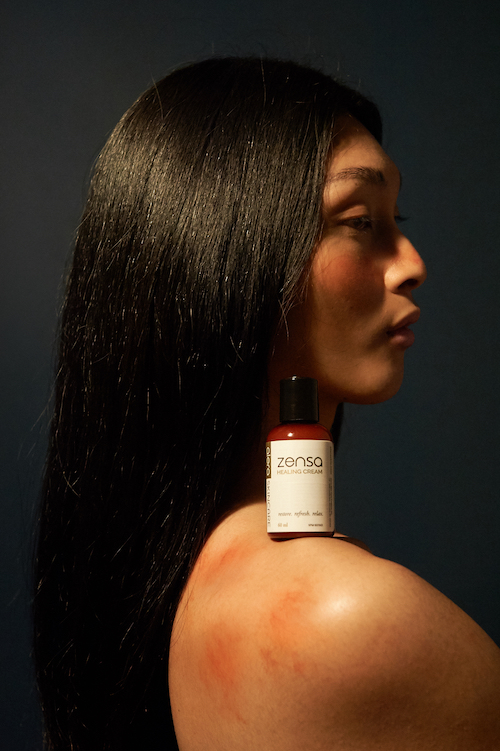
Eczema causes uncomfortable symptoms, including chronic dryness, scaly skin, redness, small inflamed bumps and severe itchiness that often gets worse at night. The itchiness can get so intense that you find yourself scratching through the night and unaware of the skin trauma, irritation, fluid leakage or bleeding you’ve caused. This persistent scratching can lead to uneven skin texture and lichenification, the term for when a patch of skin becomes thick and leathery.
Psoriasis is characterized by a covering of dry, thick and cracked skin with bumpy, red and silvery scales. More painful symptoms of the condition include frequent itching, burning, soreness and bleeding. Giving in to the urge to scratch can lead to permanent scarring.
Dehydrated (or Depleted) Skin
Unhealthy habits will inevitably show up through your skin. Living off of processed food, drinking too much alcohol (or not enough water, which can dehydrate the skin), smoking cigarettes, or not getting enough sun deprives your body of necessary vitamins and minerals. Vitamin C, D, E and K and minerals, such zinc, copper and selenium, are essential for skin health. Smoking cigarettes depletes the vitamin C in your body, while drinking too much alcohol could potentially cause deficiencies in vitamin A, C, D, E, K and B vitamins.
Whether you choose to participate in these activities, a healthy diet is essential to ensure you meet all of your nutrition needs. Make sure to incorporate a variety of whole foods and produce into your meals and snacks, including green vegetables, nuts (such as almonds, cashews, walnuts and brazil nuts), whole grains, berries, citrus fruits, beans, legumes and more. Adequate sun exposure (about 10-20 minutes a day) is necessary to maintain healthy vitamin D levels. Make it a priority to get outside every day – just remember to apply sunscreen first.

Skin Dryness
Contrary to popular belief, too little (not excessive) moisture leaves you more prone to acne and other issues that cause uneven skin texture. Proper hydration is essential for a strong skin barrier. A healthy skin barrier is important to help increase cellular turnover. It prevents clogged pores (acne), infections, and irritants that can cause eczema or rosacea flare-ups. Another benefit of a strong skin barrier is more resilient skin, which protects against sun damage (fine lines and wrinkles) and other skin texture concerns.
Pay attention to when your skin feels thin, sensitive (and more acne-prone) or you notice flakiness and rough patches forming. These signs often indicate dry skin and should make you extra mindful to apply a nourishing moisturizer (or a serum like hyaluronic acid) and drink some more water daily.
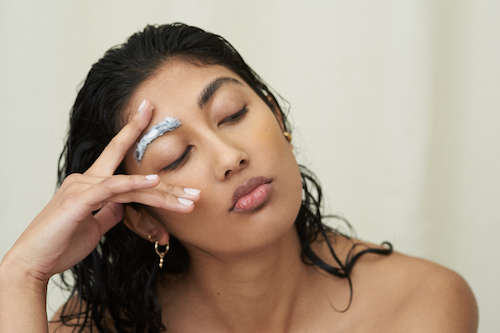
Enlarged Pores
Hormone changes and too much sun exposure are common causes of enlarged pores. While this type of uneven skin texture can be harmless, you might find the appearance undesirable and enlarged pores leave your skin more susceptible to soaking up excess oil, dirt, bacteria, pollutants, UV rays or skincare products. The side effects of having enlarged pores can include making your skin more prone to acne breakouts, skin rash or infection, irritation and sun damage.
Strengthening your skin barrier to increase cellular turnover is the best natural way to help reduce your pore size. Scroll for more potential treatment options.
Fine Lines & Wrinkles
Collagen production, which regulates cellular turnover, naturally slows down as you age. These changes make your skin gradually lose its elasticity, moisture, supple texture and youthful glow over time. Getting some wrinkles is nearly inevitable as you get older. However, bad habits and skin hygiene can accelerate the process. Avoiding unprotected sun exposure and smoking, moisturize regularly and eat a healthy diet to slow down the natural skin aging process.
Milia
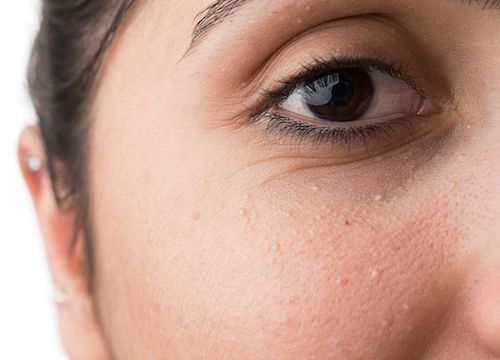
Credit: RealSelf/Pinterest
Often mistaken for whiteheads, milia are keratin-filled cysts that appear like tiny white bumps on the skin. They usually form around the thin skin in the eye area where keratin build-up sits trapped underneath clogged pores. Unprotected sun exposure and improperly removing your makeup are thought to cause milia. While there is no proven way to prevent the condition, applying sunscreen and washing your face thoroughly every day should smooth out the skin texture in this area. To get rid of existing milia, try incorporating retinol and chemical exfoliant products into your skincare routine. Using a lighter-weight eye cream and avoiding oil-based face moisturizers can help prevent the pores from clogging.
Skin Rash & Irritation
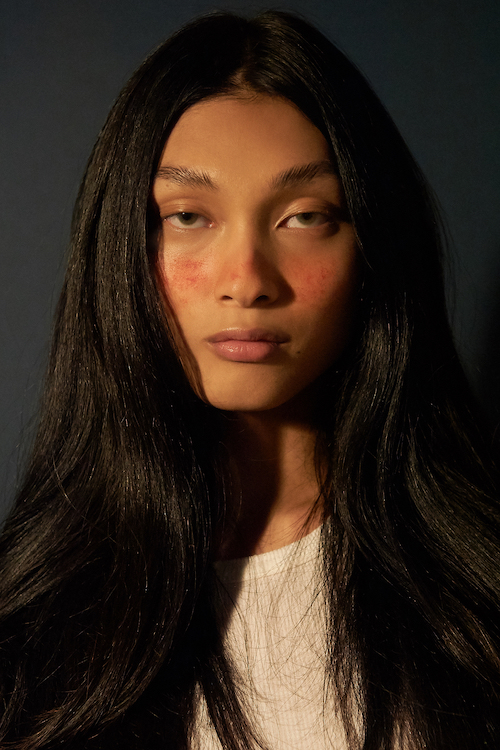
Pay attention to how your skin responds after using new skincare products and medications. Allergic reactions or ingredient sensitivities can cause mild symptoms, such as general uneven skin tone, dryness or rough patches. More severe signs indicate that you have Contact dermatitis is a reactive condition that causes red, itchy and irritating rashes, bumps and swelling on the skin. These symptoms can appear either instantaneously or days after you begin using the product. To prevent skin irritation, try to use the most natural products possible and avoid items containing fragrances or chemicals. Keep your skin well hydrated, and avoid over-exfoliating, which can damage the skin barrier.
Contact dermatitis also occurs when exposed to poison ivy, oak or sumac and bug bites. With these allergic reactions, try using a cold compress, taking a colloidal oatmeal bath with cool water or applying calamine lotion to the area 3-4 times daily.
Ways To Improve Uneven Skin Texture
Proper Skincare
Prevention will always be the best protection. Find and follow a healthy daily skin care practice that works for you to ensure that you keep your skin barrier healthy and achieve the smooth complexion you desire. Using a gentle cleanser and moisturizer twice daily with sunscreen applied in the morning is a simple routine that likely covers the basics for most individuals.
Add extra moisturizing products into your regimen if you’re experiencing particularly dry and inflamed skin or you find it needing some extra TLC. Zensa Healing Cream is formulated to reduce skin itchiness, provide eczema and relief, treat rashes and minimize scarring during the tattoo, microblading or nanoblading (nano brows) after-care process. It contains shea butter and cucumber extract to soothe and hydrate the area with calendula and grapefruit oils to reduce irritation and accelerate the skin healing process.
Exfoliate Regularly
Exfoliation is a simple and effective way to achieve a smoother complexion. The practice allows you to have a spa-like experience at home and has many benefits to clear up uneven skin texture. Exfoliation promotes collagen production and increases the rate of cellular turnover to brush away dead skin cells to prevent clogged pores, acne, dryness and flaky, rough patches. Clearer pores mean products will absorb better into the skin. A well-planned skincare routine and exfoliation are a powerful combination to get rid of uneven skin texture Learn more about the benefits of exfoliation for silky smooth skin HERE.
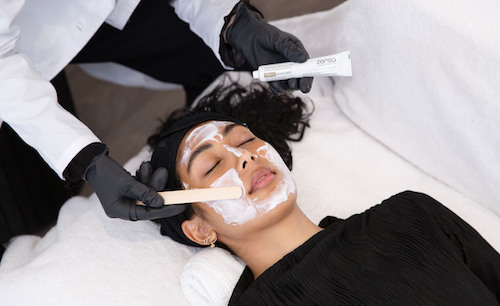
Explore Microneedling
Consider microneedling if you’re seeking to fast-track your skin’s collagen production. Otherwise known as collagen induction therapy, microneedling can significantly reduce or eliminate uneven skin texture and hyperpigmentation on your face or body. The cosmetic treatment uses a device with several tiny needles to create small, controlled injuries to trigger the body’s wound-healing abilities. This cell repairing process stimulates cellular turnover to strengthen the skin barrier, reduce enlarged pores, the appearance of fine lines, scarring and sunspots to leave you with a youthful glow. Discover more about anti-aging, skin smoothing and other benefits of microneedling HERE.
